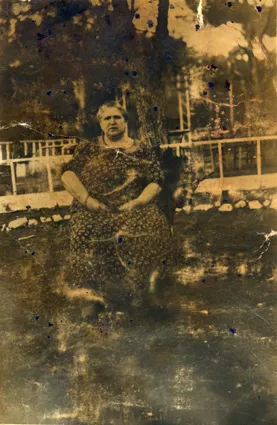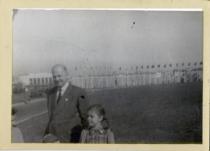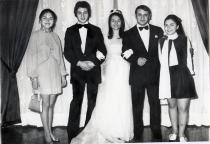My mother Sara Merkada was born in 1891 and raised in Hasköy.[A neighborhood on the European side]. She first attended the preschool in the English school in Hasköy (at that time it wasn't usual for girls to attend school in a lot of families) and unfortunately attended school only 2 years. Her father who owned a grocery store said:
-"You studied for two years, that is enough for you" and removed his daughter from school and kept her at home to help her mother. Apart from Judeo Espagnol, the only foreign words my mom knew was to count up to 100 in English.
The fathers of my parents knew each other from the business community; they arranged for the marriage of the young couple while talking to each other one day.
When they met, my mother was 17 years old, with a height of 1.80 cm. and a weight of 115 kg., and my father was 27 years old with a height of 1.55 cm., and a weight of 65 kg. None of these contradictions prevented their marriage. They had 11 children but only 6 survived. Öjeni ( Surjon 1911), Ester( Krespi 1915), Elvir( Alkabes 1917), me Nesim (1920), Eli (1923), Albert (1926), these were our birthdates and we struggled through life. Our other 5 siblings died (I don't know the cause of their deaths, maybe they were premature etc., my mother never talked about this, anyways we were very young).
My father was very authoritarian despite being having a small frame, my mother on the other hand, very easy-going, very respectful towards her spouse, she was someone who had dedicated her life to her family. Because my mother was 10 years younger than my father, he was the boss in the house. My father loved us a lot even though he was authoritarian and would do everything we asked as much as he could. Still, on the Sabbath, we would keep our distance from him and never demand anything. That's because my father normally smoked 1,5 packages of cigarettes a day, and on the Sabbath, refrained because of his faith and would be very cranky. My father was a religious man and my mother would carry out the religious obligations as much as she could in deference to him. Even though my mother was religious she would not wear a wig, she would only use a scarf when she was out on the street. Because we were raised in a faithful household, we still live and perform according to our religious beliefs.
In our house, my mom, my dad, 6 children , our maid Fatma who was the wife of a policeman and my father's widowed aunt "Tia Hursulaçi" (that's how we called our great-aunt) lived all together. Because there was a lot of us, my mother was very busy; my mom, my aunt and my grandmother who spent most of the year with us spent almost all their day in the kitchen. That is why my mother left the house only once every two weeks, because she was overweight, (I could call her "obese", apparently she was fat since she was a child) my father would take her with a horse-carriage even to a distance of 200 m.(We used to live on Istiklal Caddesi then, instead of vehicles, there were horse-carriages "Fayton" [A comfortable wooden carriage pulled by one or two horses, with a maximum capacity of 4 passengers]. Someone had to get on the horse-carriage before my mom every time, otherwise the carriage would tip off balance and fall on its side. Other than horse-carriages there were trams for public transportation"Tramvay". There were two categories of trams: the green one cost 5 kurus, the one we called first class and which was red, cost 8 kuru?. There were only 5 to 10 taxis. My mother could not take the tram or the taxi. My father enjoyed life, along with my mother, they would frequently go to "Londra bar" (London Bar) on ?stiklal Caddesi. He liked to drink raki (uzo), they would drink, eat appetizers, and listen to music. When I grew up, occasionally I would join them (there were 8-9 ladies who had beautiful voices and who would sing traditional Turkish music).
My mother developed varicose veins in her legs after her second pregnancy due to being overweight and for 25 years lived with open sores. My mother would clean these sores every day and dressed the wounds. At the time I was working in my father's store, my father would say":
-"Take money from the safe and buy your mom the supplies she needs".
I would never let the house run short on these supplies. My mother went to a professor in the German Hospital for a check-up when she was 56 years old, when the doctor said:
-"Merkada Hanim(Mrs. Merkada) I can dry these sores with electrical beams, it is a very easy operation, don't worry, you will be very comfortable", we interned my mother in the hospital, the professor claimed that the surgery was successful. My mother stayed in the hospital for 8 days, then she returned home, but she was getting worse and worse. We realized she was ill and took her to see Dr. Barbut who was a cousin of my mother and the chief doctor of Or-Ahayim Hastanesi(hospital) [the first and only Jewish hospital on the European side]. He told us:
-"When your mother's wounds were open, they would drain, now when they are covered, the infection stays in the body".
Unfortunately while we lost time at home, the infection had spread and reached the brain. Dr.Barbut took over my mother's care. He put her on "Ilkaparin" (a kind of antibiotic), (one box cost 33 liras and she had to take 3 boxes), her body did not respond well to this therapy that lasted two months and unfortunately we lost my mother in 1947, in the hospital while my wife and I had been engaged for only two months. Because she was born and raised in Hasköy, we buried her there.
The portrait of S. Merkada Alkabes
Share
Photos from this interviewee
The Centropa Collection at USHMM
The Centropa archive has been acquired by the United States Holocaust Memorial Museum in Washington, DC.
USHMM will soon offer a Special Collections page for Centropa.
Academics please note: USHMM can provide you with original language word-for-word transcripts and high resolution photographs. All publications should be credited: "From the Centropa Collection at the United States Memorial Museum in Washington, DC". Please contact collection [at] centropa.org.
































